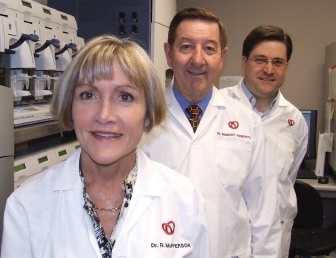
At the turn of the 21st century, what we knew about the genetic underpinnings of heart disease was limited. There had been success in identifying inherited mutations that cause relatively rare heart rhythm and muscle disorders (arrhythmias and cardiomyopathies). But the genetics of common cardiac conditions such as coronary artery disease was unknown.
Some of that early work on rare disorders was done by Robert Roberts, MD, who would become the second president and CEO of the Ottawa Heart Institute in 2004. In short order, he founded the Ruddy Canadian Cardiovascular Genetics Centre to focus facilities and expertise on the problem, and the investment quickly paid off with a groundbreaking discovery.
In 2007, Heart Institute researchers led by Ruth McPherson, MD, PhD, identified a common genetic variation that significantly increases the risk of coronary artery disease independently of other known risk factors such as cholesterol, blood pressure, diabetes or smoking. Three quarters of the population has at least one copy of the 9p21 risk variant. Individuals with one copy have a 25% higher risk of heart disease. Those with two copies (about 25% of the population) have a 30 to 40% higher risk.
9p21 was the first common cardiovascular risk variant to be discovered and today remains the most significant. Scientists around the world are trying to understand how 9p21 works in the hope of developing new drugs for prevention or treatment.
The 9p21 finding put genetic research at the Heart Institute on the map. Subsequently, the Institute joined leading international data-sharing initiatives and has participated in the discovery of many more variants related to heart disease. Researchers affiliated with the Ruddy Centre, including Dr. McPherson and Alexandre Stewart, PhD, are now heavily focused on revealing the mechanisms through which these genes function.
Coverage of their more recent work can be found here:
- How Two Genetic Risk Factors for Heart Disease Work
- Researchers Answer Important Debate About the Genetics of Heart Disease
- Function Found for Mysterious Heart Disease Gene
Our 40th Anniversary Flashback series will continue throughout 2016.
Learn More
- Read original coverage of the 9p21 discovery from The Beat
- Our 40th Anniversary

